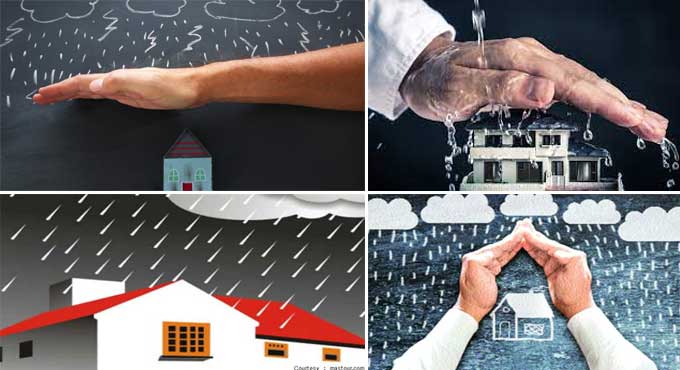
How to Waterproof or Rainproof Your Home during the Monsoon Season?
What do you mean by waterproofing?
Private homes are waterproofed to prevent water from penetrating. Keeping your home dry with rainproof measures is very important. As a result, your property is protected from damages caused by humidity or water exposure due to less humidity in the house. Besides being essential for the construction of a building, it is also important for its veracity.
What is the Importance of waterproofing a house?
Your home needs to be waterproofed, so it is essential that you do it. Dryness should be maintained inside the house, from the roof to the basement. The damage caused by water infiltration includes insect infestation, mildew, and in the worst cases, the collapse of buildings. It will be easier to avoid these problems if houses are waterproofed before construction begins.
What are some of the main significances of waterproofing?
1. Check the pipelines and gutters in your house
You may experience clogged drain pipes and water outlets in your house due to frequent rains. It is very important that you contact your plumber if you find leaks in any of the pipes, and get the problem fixed as soon as possible before it gets worse.
There is also the possibility of water logging around your house resulting in the breeding of mosquitoes and other insects around your house. You should try to keep the drainage holes clean in order to ensure that rainwater flows smoothly and easily as it should.
2. Increase of cracks and fungus
A crack in the wall is one of the first signs of damage to your private residence that you may notice when you move into it. The effects of rain can be felt on both outdoor and indoor walls. Water may seep into cracks in walls if they are not painted with waterproof paint. You may also experience an increase in fungal growth and musty odors in your living space as a result of this.
Do not ignore these wall cracks and ask your architect for assistance if you need it. Whenever you are planning to paint your home or apartment, make sure you choose rainproof paints. A disinfectant liquid or bleach can be used to remove fungus or mold.
3. Helps in the protection of wooden furniture and floors
Rain can damage wood fixtures and render them useless, so do not expose them to it. Wood and leather upholstery can be damaged by dampness and moisture.
To prevent mold and fungus from developing on your furniture, wipe the surfaces with a dry material.
Ensure your wooden floors are protected from rain by coating them with wax or polishing them. Make sure your wooden furniture is placed far away from doors and windows. In your wooden cabinets and closets, you can use camphor balls or cloves to absorb moisture and keep your house dry.
4. Ensures good ventilation throughout
To prevent bad odors and ensure freshness in your rooms, ensure good ventilation. Remember to keep the windows open when it stops raining to allow air to circulate. Mold & mildew growth results in dampness and musty odor, which can be reduced by using a dehumidifier.
5. Protect the exterior walls of the house
Waterproofing chemicals are available for various applications, including concrete, plaster, paint, and so on. Exterior walls are subject to moisture, excessive humidity, and rain, which can permeate the layers and impact inside walls.
Depending on the weather, you can still employ some of these straight forward cures. Crack sealing is essential. The exterior walls must be painted with external waterproofing paints to stop seepage.
You may avoid having wet walls in your home by using waterproof paint to build a barrier against precipitation and moisture. Just as important as exterior waterproofing of buildings is roof waterproofing.
The terrace is exposed to inclement weather, and water naturally gathers on the surface leading to leaking and moist spots within. Roofs should ideally have a waterproof roof coating that serves as a sealant and prevents water from leaking through the roof.
6. Keep the carpets safe
A house's carpet may lose its crispness in the rainy season despite being one of the finest additions. Mold and other allergens can also grow on moist objects if they absorb moisture.
To make your Waterproof house comfortable, you must roll them up and store them for future use in a waterproof, plastic cover. In the long run, it'll keep its freshness even after the rainy season is over
7. Provides protection to walls and ceilings
The concept of waterproofing dampened walls in your rooms is also a remarkable one. If you find yourself in such a situation, it is better to get help now than later.
To get more details, watch the following video tutorial.
Video Source: How to make my house
Secondly, it involves waterproofing leaky ceilings (this usually occurs in bathrooms if the roof is not properly waterproofed/the toilet over the floor is not properly sealed). These issues can also be addressed with effective proofing strategies. There are a lot of potential problems that could be avoided if this is done.


